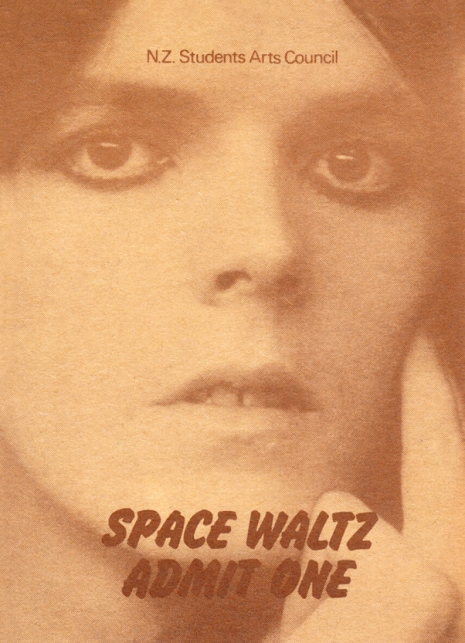
Haling from Auckland, Space Waltz were a New Zealand glam band, fronted by singer/guitarist/songwriter Alastair Riddell. After a major TV appearance that shocked the country, Riddell and Space Waltz were overnight sensations, but their success was short-lived.
Riddell formed Space Waltz in 1973, though they were originally called Stewart and the Belmonts. After deciding to focus on Riddell’s songs rather than the cover material they were playing, they changed their name to Space Waltz in 1974. Once the group solidified, Riddell’s bandmates were Greg Clark (guitar), Peter Cuddihy (bass), Brent Eccles (drums), and Tony Raynor (keyboards)
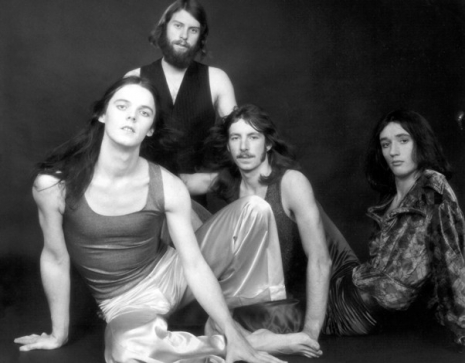
An early version of Space Waltz.
Looking to get the most eyes and ears on their new group, Space Waltz determined they should try out for the Studio One—New Faces TV talent contest. Their subsequent audition was a success and soon the group would be seen by a national audience. With a panel of judges and a variety show format—largely consisting of schlocky middle-of-the-road performers—the program was American Idol meets The Ed Sullivan Show. On the August 21, 1974 episode of Studio One—New Faces, Space Waltz were the final act of the evening. Performing Riddell’s “Out on the Street,” the unit—especially their singer—made quite an impression. As Riddell later put it, adults across the country were “shocked and appalled” by his band.
Global Glam and Popular Music: Style and Spectacle from the 1970s to the 2000s is a 2016 collection of scholarly essays concerning the glam genre. In the piece “Spotting the Rare Sequined Kiwi: Three Approaches to Glam Rock in 1970s New Zealand,” author Ian Chapman writes about Space Waltz’s TV debut and how it impacted New Zealand’s youth:
The younger members of both studio and television audiences reacted to “Out on the Street” with unbridled enthusiasm, while Riddell’s energetic stage presence and unique appearance found similar favor. Performing in make-up and lipstick and wearing a flamboyant costuming, Riddell’s vocals were highly affected while his strutting, posing, and general air of commanding confidence engendered a wide range of reactions, again largely depending upon the age of the viewer.
Space Waltz were instantly famous in New Zealand, with EMI signing the band before the TV competition even ended. At the time, David Bowie was one of the most popular glam artists in New Zealand and Riddell was viewed as the country’s version of Ziggy Stardust.
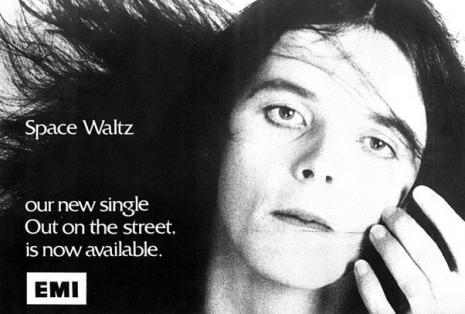
“Out on the Street” was rush-released as a single, in order to coincide with Space Waltz’s second television appearance, which would be the Studio One—New Faces finale. The group did another Riddell original, “Beautiful Boy,” with Mike Chunn from Split Enz on bass. Ultimately, they don’t end up with enough votes to win the New Faces contest, though it hardly mattered. Before the vote tally, one judge on the panel exclaims, “My mother hates them!” But he also praises the unit, predicting “Out on the Street” will be a hit.
That judge was right, as a couple of weeks later, “Out on the Street” was #1 in New Zealand. A successful national tour—complete with screaming teens—followed.
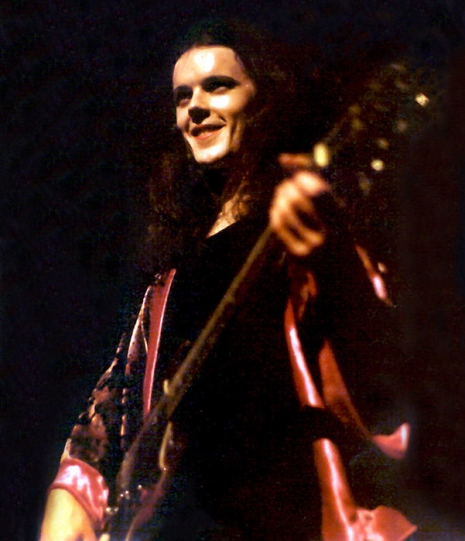
For the holiday program, POP CO 1974 Xmas Special, Space Waltz rightly played their smash hit, “Out in the Street,” and TV audiences see the band in color for the first time.
If the play button isn’t visible, hover your cursor over the image:
In all of the Space Waltz television appearances, Riddell is clearly charismatic, striking the appropriate glam rock poses. The façade frequently breaks, though, as he can’t help but crack multiple “I’m on TV!” smiles. They’re incredibly sweet and charming performances, don’tcha think?
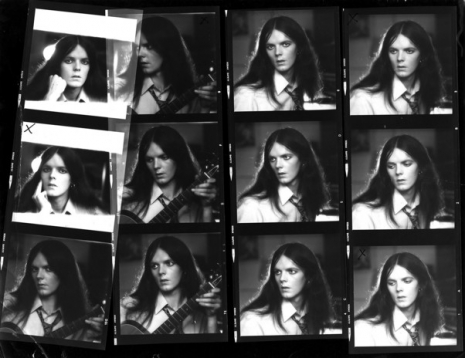
In early 1975, Space Waltz recorded their debut album. Riddell clashed with EMI over how much time they were given (just ten days) and the resulting mix, which wasn’t to Riddell’s liking. Released in May, the oddly-titled, Space Waltz by Alastair Riddell (all songs by Riddell), didn’t chart as high as anticipated, stalling at #15 in New Zealand. A second single, “Fraulein Love” didn’t make waves either. EMI refused to fund a tour, so the band had to borrow money to do it themselves. But the outing wasn’t as successful as their first, and they lost a significant amount of money.
The band tried their luck in Australia, relocating there in October. Their new manager thought they should give it a go in the UK, but all the members of the group—save for their frontman—didn’t like the idea. The manager bolted and suddenly the band had little on the horizon. By the end of the year, everyone except for Riddell had moved back to New Zealand. Incredibly, little more than a year after they topped the charts in their home country, Space Waltz were no more.
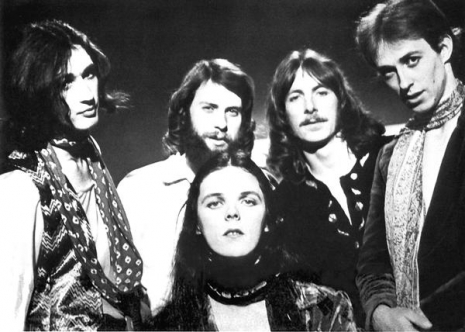
The Space Waltz album has been reissued, but it looks like it’s somewhat hard to come by these days. In 2005, RPM Records put on a CD edition, though it appears it’s now out of print. Last I checked, there were a handful of copies available for sale on Amazon, so try your luck there. You can listen to the record via YouTube.
David Bowie’s the most obvious influence on the Space Waltz sound, though early Roxy Music surely made a major impression on them, too. In addition to Bowie and Bryan Ferry, Riddell’s dramatic vocal style also brings to mind Marc Bolan and crooner Anthony Newley.
In the years after Space Waltz disbanded, Alastair Riddell put out a couple of solo records, and seems to have largely moved on from music, though his Facebook page indicates he’s working on new material. He’s recently turned to filmmaking, directing a handful of pictures, to date. His latest is called West of Eden.
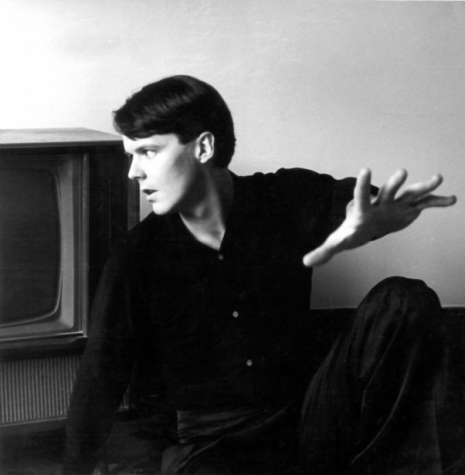
Riddell in 1976.
In 2007, Space Waltz were featured on one of those “Where are they now?”-type shows. The reformed band played “Out in the Street,” naturally, and are interviewed afterwards. There’s also footage from that initial 1974 Studio One—New Faces episode that made the group famous, with reactions from the judges after seeing Space Waltz for the first time. Good stuff!
Previously on Dangerous Minds:
Split Enz: This twitchy weirdo cult act was New Zealand’s greatest musical export
Glam rockers Supernaut & their epic 70s jams about lollipops, ‘Space Angels’ & bisexuality
A night spent hanging out with David Bowie and Iggy Pop: Ivan Kral tells us what it was like